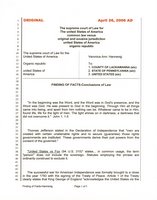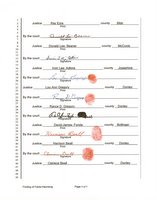Ignorance, Apathy, or Premeditated Deceit: Why I’ll be voting "No!" this November on the ballot issues pertaining to proposed Constitutional Amendments numbers 1 and 2.
I recently requested and received from Representative Jim Wansacz’s office a packet of information containing the various studies that are being used by our representatives in support of the proposed changes to Article I, Section 9, and Article V, Section 10(c), of the Constitution of the Commonwealth of Pennsylvania. In addition to the studies, Representative Wansacz’s office included the history of this ballot question; a portion of which (per Senator, Stewart Greenleaf’s 7/25/03 article in the Philadelphia Inquirer; "Children should be able to testify outside court") was approved "3-1" by the electorate in 1995.
According to the Greenleaf article the 1995 referendum was "struck down on a technicality in 1999 by the State Supreme Court". The court ruled that "the child-witness ballot question should have been split into two amendments": One, to change the wording of the State Constitution that requires "face-to-face confrontation of the witness by the accused; the other would allow the General Assembly to set standards for child-witness testimony." Senator Greenleaf’s article further states, "If voters approve these ballot questions this fall, Pennsylvania will join the majority of states in providing the option of videotaped or closed-circuit television testimony to children emotionally incapable of testifying while facing the accused in court."
The packet of information I received from Representative Wansacz’s office consisted of 28 pages, 12 separate articles. One from the web site, The Future of Children, subtitled "Children as Witnesses" from an article, "Adjudication of Child Sexual Abuse Cases", was 12 pages. A portion of page 7 of this article, beginning with the subheading "Courtroom Accommodations for Young Witnesses", was word-for-word to page 12 in a separate 3 page format. In reading the full (12 page) article for myself, I found no support for any changes to the Pennsylvania Constitution. In fact, the article seems to advise against such changes! Here are a few key quotes from the article:
Page 1 of 12 - "It is ironic that children are victimized because they are weak, and yet children’s strength on the witness stand is often their best hope for protection."
Page 2 of 12 - "There was a time in American law when . . . The judge asked questions to assess the youngster’s cognitive and moral capacities and ability to take an oath. If the child possessed sufficient understanding, the child testified. During the era when children were presumed incompetent, most youngsters passed this preliminary test."
Page 3 of 12 - "There is evidence, . . . , that some well-intentioned but misguided therapists, police, social workers, and attorneys use interview techniques that could distort children’s memories. . . . Improper interviewing may actually create a "memory" of abuse that never happened. In these instances, children describe nonexistent abuse, all the while believing what they say. Although wholesale creation of abuse "memories" appears to be rare, the possibility cannot be ignored."
Page 4 of 12 - "(C)oncern about young children’s suggestibility is well founded, but should not be exaggerated. . . . experiments . . . demonstrate . . . that - given the right circumstances, young children can be quite suggestible . . . when preschoolers are interviewed over and over again with highly misleading questions, many of them eventually make inaccurate statements."
Page 5 of 12 - "Abused children often are threatened into silence, many are ambivalent about disclosing, and some are embarrassed."
Page 6 of 12 - "(A)s the number of suggestive questions goes up, confidence in the child’s statements goes down. . . . The challenge is to reduce the need for such questions while, at the same time, respecting the need to ask them."
In examining the Future of Children web site for their "Recommendations and Analysis" I found that the videotaping emphasis is NOT to keep children out of the courtrooms by videotaping their deposition or testimony by closed-circuit television, but TO HAVE A VIDEO RECORD OF THE INTERVIEW PROCESS.
Here is an excerpt from this site:
"Videotaping Interviews (Approximately half way down the page):
"Given the level of current knowledge about suggestibility, the trier of fact is often asked to determine from all of the evidence before the court whether a particular child's testimony was tainted by the nature of questions asked, the use of dolls, or some other factor. A positive development has been the growing practice of videotaping investigative interviews with children. Videotaping accomplishes several things. First, it may minimize the number of interviews a child must go through because the variety of professionals involved in investigating these cases can view the tape and perhaps get the information that they need without re-interviewing the child. Second, the tape can capture body language, tone, and facial expressions, all of which can help portray what both the interviewer and the child are communicating. In many cases, issues of the credibility and suggestibility of the child are raised, and the videotape can show a judge and jury a more complete picture of how the interview was conducted."
The web site used for justifying these changes to our Constitution appear to contradict legislative findings in that it goes on to show:
"There is . . . the need to provide preparation and support for the child abuse victim as he goes through the trial process. . . . These steps include familiarizing the child ahead of time with the courtroom, establishing court schools for children who are scheduled to testify, and allowing a trusted adult to remain in the courtroom while the child testifies. Such efforts should be developed by all courts hearing these cases.
"Judges also play an important role in protecting and assisting the child during the adversarial process. As with any witness, judges have considerable discretion in controlling the questioning of the child, either by cautiously permitting somewhat leading questions for the child or by controlling when necessary the tactics and scope of defense cross-examination. Judges also have leeway in some circumstances to allow the child to testify outside the direct presence of the alleged offender. Judges need to be familiar with the available options and the criteria for using them."
Clearly, there is NO justification for changes or amendments to the Pennsylvania Constitution, (other than restoring the correct wording to Article I, Section 9, of the current issue which continues to be printed with the changes that were struck down in 1999).
What IS justified is a grassroots community approach in implementing the recommendations for education to provide preparation and support for the child abuse victim as he goes through the trial process. As indicated above, these steps include familiarizing the child ahead of time with the courtroom, establishing court schools for children who are scheduled to testify, and allowing a trusted adult to remain in the courtroom while the child testifies. In addition, judges need to protect and assist the child during the adversarial process. Judges should be held accountable for their control over the questioning of a child, either by cautiously permitting somewhat leading questions for the child or by controlling when necessary the tactics and scope of defense cross-examination.
According to the articles sent by Representative Wansacz’s office, judges already have leeway in some circumstances to allow the child to testify outside the direct presence of the alleged offender. The bottom line is that it is the judges that need to take responsibility for their courtrooms and be familiar with their available options and the criteria for using them, rather than simply legislating the tough ones out of existence by advocating changes to our Pennsylvania Constitution.








